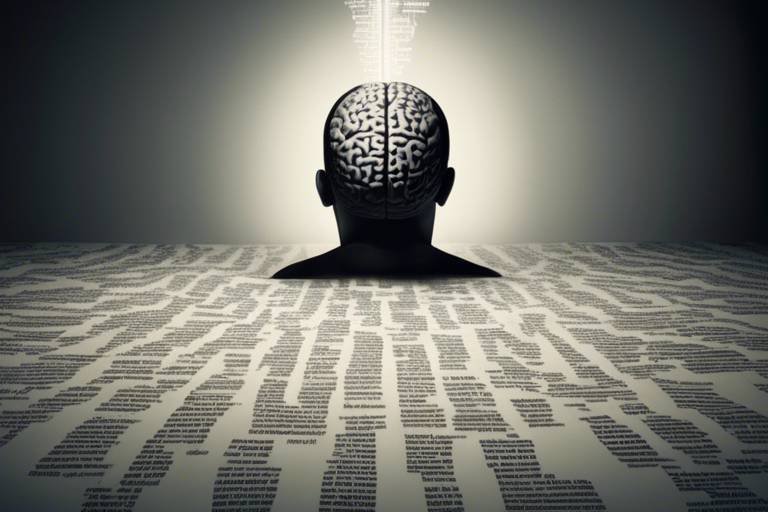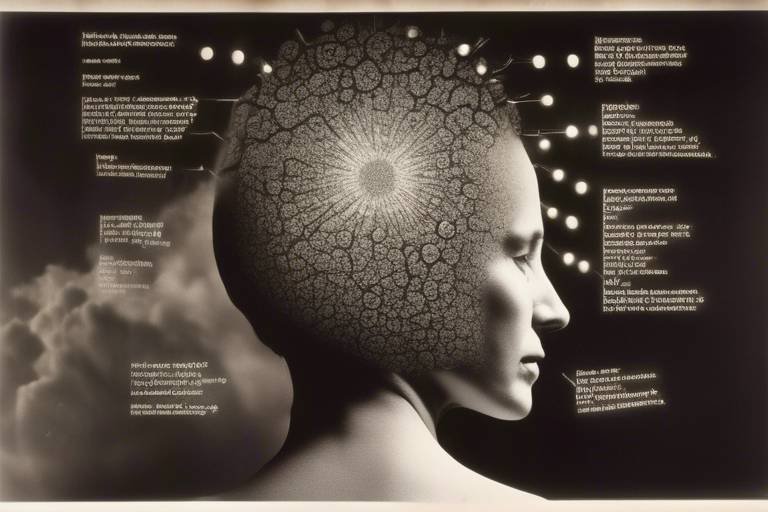Revisiting the Hard Problem of Consciousness
Consciousness—it's a word that stirs up curiosity and wonder in equal measure. Have you ever found yourself pondering what it truly means to be aware? Or why we experience the world in such a vivid, personal way? The hard problem of consciousness is not just a philosophical puzzle; it's a profound inquiry that touches on the very essence of our existence. This article delves into the complexities of consciousness, exploring its philosophical implications, scientific inquiries, and the ongoing debates surrounding subjective experience and the nature of reality.
At its core, the hard problem of consciousness challenges us to understand why and how we have subjective experiences. While science can explain brain processes and neural correlates, it often falls short of addressing the qualitative aspects of those experiences—what it feels like to taste chocolate or hear a symphony. This enigmatic quality makes consciousness one of the most compelling topics in both philosophy and science.
As we embark on this journey, we will traverse various landscapes of thought—from ancient philosophical debates to cutting-edge neuroscience. Each perspective offers unique insights and raises more questions than answers, much like trying to catch smoke with your bare hands. So, buckle up as we take a closer look at the nature of consciousness, the philosophical perspectives that have shaped our understanding, and the scientific investigations that continue to push the boundaries of knowledge.
Understanding consciousness begins with defining its essence. What is consciousness, really? It’s a question that has puzzled thinkers for centuries. Some define it as the state of being awake and aware of one’s surroundings, while others delve deeper, suggesting that consciousness encompasses not just awareness, but also the ability to experience thoughts, feelings, and sensations. This section examines various interpretations and theories that attempt to clarify what consciousness truly is, laying the groundwork for deeper exploration.
To illustrate the complexity of consciousness, consider the following table that summarizes key definitions:
| Definition | Description |
|---|---|
| Awareness | The state of being conscious of something, such as external stimuli or internal thoughts. |
| Sentience | The capacity to have feelings and experiences, often associated with pain and pleasure. |
| Self-awareness | The recognition of oneself as an individual, separate from the environment and others. |
These definitions highlight the multifaceted nature of consciousness, suggesting that it might not be a singular phenomenon but rather a tapestry woven from various threads of experience. As we proceed, we will encounter different philosophical perspectives that attempt to make sense of this intricate web.
Philosophers have long grappled with the hard problem of consciousness. This section discusses key philosophical viewpoints, including dualism, physicalism, and panpsychism, offering insights into their implications for understanding conscious experience. Each perspective offers a unique lens through which we can examine the enigma of consciousness, and it’s fascinating to see how these ideas have evolved over time.
The debate between dualism and physicalism centers on the relationship between mind and body. Dualism posits that the mind and body are distinct entities, while physicalism argues that everything about consciousness can be explained through physical processes. This subheading explores both positions, highlighting their strengths and weaknesses in addressing the hard problem.
Proponents of dualism argue for the distinct nature of mind and body. They suggest that subjective experiences cannot be fully explained by physical processes alone. Key arguments supporting dualism include:
- The richness of subjective experience, which seems to transcend physical explanations.
- Instances of mental phenomena that cannot be easily correlated with brain activity.
- The intuitive sense that thoughts and feelings are more than mere biological functions.
On the flip side, physicalism posits that everything about consciousness can be explained through physical processes. Advocates argue that as our understanding of the brain advances, we will uncover the mechanisms behind consciousness. This perspective emphasizes:
- The correlation between brain activity and conscious experience, suggesting a direct link.
- Advancements in neuroscience that continue to illuminate the workings of the brain.
- The potential for future discoveries to bridge the gap between subjective experience and physical processes.
Panpsychism suggests that consciousness is a fundamental feature of all matter. This perspective offers a fresh take on the hard problem, proposing that consciousness does not emerge from complex systems but is inherent in all things. This section discusses the appeal of panpsychism in addressing the hard problem and its potential to unify consciousness with the physical world.
As we delve deeper, we find that scientific approaches to consciousness involve interdisciplinary research. Recent advancements in neuroscience and psychology seek to unravel the mysteries of conscious experience. Neuroscience plays a crucial role in understanding consciousness, exploring how brain activity correlates with conscious experience and the implications of these findings for the hard problem.
Neuroscience has made significant strides in understanding how the brain functions. Researchers utilize various techniques, such as fMRI and EEG, to observe brain activity during different conscious states. These findings are pivotal in linking specific neural correlates to conscious experiences, offering tantalizing clues about the workings of the mind.
Psychology also offers insights into how consciousness affects behavior and cognition. Various psychological theories and experiments contribute to our understanding of conscious experience, emphasizing the intricate relationship between mind and behavior. From cognitive psychology to behavioral studies, the psychological lens sheds light on the complexities of consciousness.
The exploration of consciousness raises intriguing questions about artificial intelligence. As we develop more sophisticated AI systems, the ethical considerations surrounding machine consciousness become increasingly relevant. Can machines possess consciousness? If so, what rights would they hold? This section examines the implications of consciousness studies for AI development and the ethical considerations that arise.
As the study of consciousness evolves, new theories and methodologies emerge. The quest to solve the hard problem is ongoing, and future research may uncover new insights that challenge our current understanding. This concluding section discusses potential future directions for research and the ongoing quest to solve the hard problem of consciousness.
- What is the hard problem of consciousness? The hard problem of consciousness refers to the challenge of explaining why and how we have subjective experiences.
- What are the main philosophical perspectives on consciousness? Key perspectives include dualism, physicalism, and panpsychism, each offering different insights into the nature of consciousness.
- How does neuroscience contribute to our understanding of consciousness? Neuroscience explores the relationship between brain activity and conscious experience, helping to identify neural correlates of consciousness.
- What are the ethical implications of consciousness in artificial intelligence? As AI systems become more advanced, questions arise about their potential consciousness and the ethical treatment of such entities.

The Nature of Consciousness
Understanding consciousness is like trying to catch smoke with your bare hands; it slips through your fingers no matter how hard you try to grasp it. At its core, consciousness is the state of being aware of and able to think about one's own existence, sensations, thoughts, and surroundings. But what does that really mean? To delve deeper, we must explore various interpretations and theories that have emerged over centuries, each attempting to clarify this enigmatic phenomenon.
One of the most profound questions surrounding consciousness is: Is it merely a byproduct of brain activity, or is there something more to it? Some argue that consciousness is a complex interplay of neural processes, while others believe it transcends the physical realm. This debate lays the groundwork for our exploration into the nature of consciousness, revealing a landscape filled with philosophical inquiries and scientific investigations.
To better understand the nature of consciousness, let's examine some of the key theories that have shaped our understanding:
- Physicalism: This theory posits that everything about consciousness can be explained through physical processes. According to physicalists, our thoughts, feelings, and experiences are all rooted in the biological functions of the brain.
- Dualism: In stark contrast, dualism suggests that the mind and body are fundamentally different entities. Proponents of dualism argue that consciousness cannot be fully explained by physical processes alone, emphasizing the subjective nature of experience.
- Panpsychism: This intriguing perspective proposes that consciousness is a fundamental feature of all matter, suggesting that everything, from rocks to humans, possesses some form of consciousness. This theory attempts to bridge the gap between the physical and the experiential.
These theories not only highlight the complexity of consciousness but also raise critical questions about the very nature of reality. For instance, if consciousness is a product of physical processes, what happens to our understanding of free will? Conversely, if consciousness exists independently of the physical world, how do we reconcile this with our scientific understanding of the universe?
As we navigate through these theories, it becomes increasingly clear that consciousness is not just a scientific or philosophical puzzle; it is a deeply personal experience that shapes our understanding of ourselves and our place in the world. Every moment of awareness, every fleeting thought, contributes to the rich tapestry of our conscious experience.
In summary, the nature of consciousness remains one of the most profound mysteries of our time. As we continue to explore its nuances and implications, we find ourselves at the intersection of science, philosophy, and personal experience, each offering unique insights into what it means to be conscious. This ongoing quest not only enriches our understanding of consciousness but also invites us to reflect on our own existence and the nature of reality itself.

Philosophical Perspectives
When we dive into the realm of consciousness, we find ourselves navigating a complex web of philosophical ideas that have emerged over centuries. Philosophers have long been captivated by the enigma of consciousness, and their explorations have led to a variety of interpretations and theories. These perspectives not only enrich our understanding but also challenge the very fabric of what we perceive as reality. So, what are the key philosophical viewpoints that help us unravel this intricate puzzle?
At the heart of the debate are three primary schools of thought: dualism, physicalism, and panpsychism. Each of these theories offers a unique lens through which we can examine the nature of consciousness. Dualism posits that the mind and body are fundamentally distinct entities, suggesting that our mental states are not merely the result of physical processes. This perspective raises intriguing questions about the nature of subjective experience, as it implies that our thoughts and feelings exist independently of the physical world.
On the other hand, physicalism contends that everything about consciousness can be explained through physical processes, arguing that mental states are ultimately reducible to brain activity. This viewpoint challenges the dualistic notion of a separate mind, asserting that understanding the brain's workings will eventually illuminate the mysteries of consciousness. However, this perspective is not without its critics. Detractors argue that physicalism fails to account for the richness of subjective experience, often referred to as the 'qualia'—the individual instances of subjective, conscious experience.
Now, let's take a closer look at how these two perspectives compare:
| Aspect | Dualism | Physicalism |
|---|---|---|
| Mind-Body Relationship | Distinct entities | Unified entity |
| Explanation of Consciousness | Non-physical properties | Physical processes |
| Subjective Experience | Central to understanding | Secondary to physical explanation |
Lastly, we have panpsychism, a perspective that has gained traction in recent years. This theory posits that consciousness is a fundamental feature of all matter, suggesting that even the smallest particles possess some form of consciousness. This idea might seem far-fetched at first, but it offers a fascinating framework for reconciling the physical and mental realms. By proposing that consciousness is ubiquitous, panpsychism provides a potential solution to the hard problem of consciousness, allowing us to view the universe as a tapestry of interconnected conscious experiences.
In summary, the philosophical perspectives on consciousness are as diverse as they are profound. Each theory offers valuable insights, challenging us to rethink our assumptions about the mind, body, and the nature of reality itself. As we continue to explore these ideas, we may find that the answers to the hard problem of consciousness lie not in a single viewpoint, but rather in a rich dialogue between these philosophical traditions.
- What is the hard problem of consciousness? The hard problem of consciousness refers to the difficulty of explaining why and how we have subjective experiences.
- How does dualism differ from physicalism? Dualism posits that the mind and body are separate, while physicalism argues that everything about consciousness can be explained through physical processes.
- What is panpsychism? Panpsychism is the view that consciousness is a fundamental aspect of all matter, suggesting that even elementary particles may possess some form of consciousness.

Dualism vs. Physicalism
The debate between dualism and physicalism is at the heart of the discussions surrounding consciousness. These two philosophical perspectives offer contrasting views on the relationship between the mind and the body, each with its own implications for understanding conscious experience. Dualism, famously championed by René Descartes, posits that the mind and body are fundamentally different substances. This viewpoint suggests that mental phenomena cannot be fully explained by physical processes alone. In contrast, physicalism argues that everything about consciousness can be understood through the lens of physical science, asserting that mental states are ultimately reducible to brain states.
To illustrate the differences between these two positions, consider the following table:
| Aspect | Dualism | Physicalism |
|---|---|---|
| Nature of Mind | Non-physical substance | Physical processes |
| Relationship to Body | Distinct and separate | Interdependent and unified |
| Explanatory Power | Limited by physical explanations | Able to explain consciousness through brain activity |
| Philosophical Implications | Suggests a spiritual or immaterial aspect of existence | Supports a materialist view of the universe |
Proponents of dualism argue that our subjective experiences—like the feeling of joy or the pain of loss—are too rich and complex to be reduced to mere brain activity. They claim that the essence of these experiences is non-physical, which leads to the question: if the mind is separate from the body, how do they interact? This question remains a significant challenge for dualists, as they must explain the connection between the immaterial mind and the physical body.
On the other hand, physicalists contend that advances in neuroscience increasingly support their view. They argue that as we learn more about the brain's structure and functions, we can correlate specific mental states with particular neural activities. For example, when we experience happiness, certain neurotransmitters are released in the brain, creating a physiological response that can be measured. This perspective leads to a more unified understanding of consciousness as something that emerges from physical processes rather than as a separate entity.
Both perspectives have their strengths and weaknesses. Dualism provides a compelling explanation for the richness of human experience but struggles with the interaction problem. Physicalism, while grounded in scientific inquiry, faces challenges in addressing the subjective quality of consciousness. This ongoing debate raises fundamental questions about the nature of reality and our place within it. Are we merely biological machines, or is there something more profound at play in our conscious experiences?
In conclusion, the dualism versus physicalism debate is not just an academic exercise; it has real implications for how we understand ourselves and the world around us. As we continue to explore the mysteries of consciousness, the insights gained from both perspectives can help us navigate the complexities of human experience.
- What is dualism? Dualism is the philosophical belief that the mind and body are distinct entities, with the mind being non-physical.
- What is physicalism? Physicalism is the view that everything about consciousness can be explained through physical processes and brain activity.
- What are the implications of these theories? The implications include how we understand consciousness, the nature of reality, and even the development of artificial intelligence.
- Can both perspectives coexist? Some philosophers argue for a middle ground, suggesting that both physical and non-physical aspects may play a role in consciousness.

Arguments for Dualism
Dualism, a philosophical stance that posits the mind and body as fundamentally distinct entities, has captivated thinkers for centuries. At its core, dualism argues that our mental experiences cannot be fully explained by physical processes alone. This perspective invites us to ponder profound questions about the nature of reality and our place within it. One of the primary arguments for dualism stems from the subjective nature of experience. Consider your own thoughts and feelings—can they be reduced to mere brain activity? For many, the answer is a resounding no. The richness of our inner lives, filled with emotions, thoughts, and sensations, seems to transcend physical explanations.
Moreover, dualism highlights the limitations of physical explanations. While neuroscience has made remarkable strides in mapping brain activity to certain behaviors, it often falls short of explaining why those behaviors occur in the first place. For instance, if we take a look at the phenomenon of qualia—those unique, subjective experiences of perception—dualists argue that these cannot be fully captured by physicalist accounts. To illustrate, think about the color red. While we can describe the wavelengths of light that correspond to red, the experience of seeing red is something entirely different. This distinction raises the question: can physical processes ever truly account for our qualitative experiences?
Another compelling argument for dualism is the existence of mental phenomena that seem to operate independently of the physical brain. For example, consider the phenomenon of intentionality, where thoughts can refer to things that are not physically present. When you think about a future event or recall a memory, your mind engages in a process that seems disconnected from the immediate physical world. This leads to the conclusion that mental states have a unique quality that physical states do not possess.
In addition to these philosophical arguments, dualism resonates with many people's intuitive understanding of their own consciousness. Our day-to-day experiences often reinforce the idea that we are more than just biological machines. The feeling of having a self, of making choices, and of experiencing love and joy feels deeply personal and real. This subjective reality challenges the notion that we can be fully understood through a purely physical lens.
Ultimately, the arguments for dualism invite us to consider the complexities of consciousness and the limitations of our current scientific understanding. While physicalism offers a compelling framework for understanding many aspects of the universe, dualism serves as a reminder that the mind's mysteries may extend beyond the physical realm. As we continue to explore these profound questions, the dialogue between dualism and physicalism remains a vibrant and essential part of the philosophical landscape.
Frequently Asked Questions
- What is dualism? Dualism is the philosophical view that the mind and body are distinct and separate entities.
- What are the main arguments for dualism? Key arguments include the subjective nature of experience, limitations of physical explanations, and the existence of mental phenomena that operate independently of the physical brain.
- How does dualism relate to consciousness? Dualism suggests that consciousness cannot be fully explained by physical processes alone, highlighting the unique qualities of mental experiences.
- What is the difference between dualism and physicalism? Dualism posits a distinction between mind and body, while physicalism asserts that everything about consciousness can be explained through physical processes.

Arguments for Physicalism
Physicalism, the philosophical position asserting that everything about consciousness can be explained through physical processes, presents a compelling framework for understanding the mind. At its core, physicalism posits that our thoughts, emotions, and experiences are rooted in the biological functioning of the brain. This perspective holds that consciousness is not an ethereal or separate entity but rather a product of neural interactions and chemical processes. One of the strongest arguments for physicalism is the correlation between brain activity and conscious experience. Numerous studies have demonstrated that changes in brain states can lead to corresponding changes in awareness and perception. For instance, when specific areas of the brain are stimulated, individuals can report vivid sensations or even altered states of consciousness.
Moreover, physicalism is bolstered by advancements in neuroscience. As we delve deeper into the workings of the brain, we uncover more about how neural pathways and neurotransmitters contribute to our conscious experience. Techniques like functional MRI (fMRI) and electroencephalography (EEG) allow researchers to visualize and measure brain activity in real-time, revealing how specific thoughts or feelings correlate with particular brain regions. This growing body of evidence suggests that consciousness is intricately linked to physical processes, challenging the notion of a non-physical mind.
Another significant argument for physicalism is its ability to provide a unified scientific framework for understanding consciousness. By grounding our understanding of the mind in the physical realm, physicalism encourages an interdisciplinary approach, drawing from fields such as neuroscience, psychology, and even physics. This integration fosters a more comprehensive understanding of how consciousness arises and operates, as it allows for the examination of both the biological mechanisms and the psychological implications of conscious experience.
Critics of dualism often point to the explanatory gap that exists when attempting to connect non-physical mental states with physical brain processes. Physicalism addresses this gap by asserting that there is no need to invoke a separate realm of existence for consciousness; instead, it can be fully accounted for within the physical domain. This perspective eliminates the complexities and ambiguities associated with dualistic interpretations, simplifying the dialogue surrounding consciousness.
In summary, the arguments for physicalism emphasize the idea that consciousness is fundamentally a product of physical processes. This view not only aligns with the current scientific understanding of the brain but also provides a coherent framework for exploring the intricate relationship between mind and body. As research continues to unfold, the physicalist perspective remains a vital player in the ongoing quest to unravel the mysteries of consciousness.
- What is physicalism? Physicalism is the philosophical view that everything about consciousness can be explained through physical processes in the brain.
- How does neuroscience support physicalism? Neuroscience provides evidence that changes in brain activity correlate with changes in conscious experience, suggesting that consciousness arises from physical brain functions.
- What are the criticisms of physicalism? Critics argue that physicalism fails to account for subjective experiences and the qualitative aspects of consciousness, often referred to as the "hard problem."
- Is physicalism widely accepted? While many scientists and philosophers support physicalism, debates continue, especially regarding its ability to fully explain consciousness.

Panpsychism and Its Appeal
Panpsychism is a fascinating philosophical theory that posits that consciousness is not exclusive to humans or higher animals but is instead a fundamental feature of all matter. Imagine for a moment that every particle in the universe, from the tiniest atom to the largest celestial body, possesses some form of consciousness. This perspective challenges our traditional understanding of consciousness as something that emerges only in complex biological systems. Instead, it suggests that consciousness is woven into the very fabric of reality, much like gravity or electromagnetism.
One of the most appealing aspects of panpsychism is its potential to bridge the gap between the physical and the mental. In a world where science increasingly uncovers the intricate workings of the brain, the question arises: how do these physical processes give rise to subjective experiences? Panpsychism offers a solution by proposing that consciousness exists at all levels of matter. This idea could unify the mind-body problem, suggesting that rather than being separate entities, mind and matter are intrinsically linked.
Supporters of panpsychism argue that it provides a more comprehensive framework for understanding consciousness than traditional dualism or physicalism. For instance, while dualism posits a strict separation between mind and body, and physicalism reduces consciousness to mere physical processes, panpsychism allows for a more nuanced view. It acknowledges the complexity of conscious experience while asserting that consciousness is a fundamental aspect of existence. This perspective resonates with many who find the hard problem of consciousness particularly perplexing.
Moreover, panpsychism has gained traction in contemporary discussions about consciousness, particularly in light of advancements in neuroscience and quantum physics. Some researchers have begun to explore the implications of this theory in scientific contexts, examining how it might inform our understanding of consciousness in both biological and artificial systems. This exploration raises intriguing questions: If consciousness is a fundamental property of matter, could machines or even simple organisms possess some form of consciousness? How would this reshape our ethical considerations regarding AI and the treatment of non-human entities?
In summary, panpsychism offers a compelling alternative to traditional theories of consciousness. By suggesting that consciousness is a universal trait of matter, it opens the door to a vast array of possibilities regarding the nature of reality and our place within it. As we continue to explore the depths of consciousness, panpsychism may provide the key to unlocking some of the most profound mysteries of existence.
- What is panpsychism? Panpsychism is the philosophical view that consciousness is a fundamental feature of all matter, suggesting that even the smallest particles possess some form of consciousness.
- How does panpsychism differ from dualism and physicalism? Unlike dualism, which separates mind and body, and physicalism, which reduces consciousness to physical processes, panpsychism posits that consciousness is intrinsic to all matter.
- What are the implications of panpsychism for artificial intelligence? If consciousness is a universal trait, it raises ethical questions about the treatment of AI and other non-human entities, suggesting that they may possess some form of consciousness.
- Is there scientific support for panpsychism? While panpsychism is primarily a philosophical theory, some researchers are exploring its implications in neuroscience and quantum physics, leading to intriguing discussions about the nature of consciousness.

Scientific Investigations
When it comes to the enigma of consciousness, scientific investigations are akin to a treasure hunt, where researchers sift through layers of complexity to uncover the elusive gems of understanding. The interdisciplinary nature of this quest is fascinating, as it brings together fields such as neuroscience, psychology, and even philosophy, each contributing unique insights into the fabric of conscious experience. Recent advancements have propelled this exploration forward, enabling scientists to probe deeper into the mechanisms that underlie our awareness and subjective experiences.
One of the most compelling areas of research lies within the realm of neuroscience. Neuroscientists have made significant strides in mapping brain activity to conscious experience. Through techniques like functional Magnetic Resonance Imaging (fMRI) and Electroencephalography (EEG), researchers can observe the brain in action and correlate specific patterns of neural activity with various states of consciousness. For instance, studies have shown that certain brain regions, such as the prefrontal cortex and the thalamus, play critical roles in maintaining conscious awareness. These findings raise intriguing questions: Is consciousness merely a byproduct of brain activity, or is there something more profound at play?
Moreover, the field of psychology contributes to our understanding of consciousness by examining how it influences behavior and cognition. Psychological experiments often reveal the intricate ways in which our conscious thoughts can shape our actions. For example, the phenomenon of priming demonstrates how subtle cues can unconsciously influence our decisions, suggesting that much of our behavior is guided by factors we may not even be aware of. This interplay between conscious and unconscious processes adds another layer of complexity to the hard problem of consciousness.
To illustrate the relationship between brain activity and conscious experience, consider the following table that summarizes key findings from recent studies:
| Study | Key Findings | Implications |
|---|---|---|
| fMRI Study on Visual Awareness | Identified specific brain regions activated during visual processing. | Supports the idea that consciousness is linked to neural correlates. |
| EEG and Sleep Studies | Showed distinct brain wave patterns associated with different sleep stages. | Highlights the dynamic nature of consciousness across states. |
| Priming Experiments | Demonstrated unconscious influences on decision-making. | Challenges the notion of a fully conscious decision-making process. |
As we dive deeper into these scientific investigations, it's essential to remain mindful of the broader implications. The quest to understand consciousness not only sheds light on what it means to be human but also raises ethical questions about the nature of awareness itself. For instance, as we develop artificial intelligence systems that mimic human-like behaviors, we must grapple with the question: Can machines ever achieve consciousness, or are they merely sophisticated algorithms devoid of true awareness? This inquiry not only challenges our understanding of consciousness but also compels us to reconsider the moral implications of creating entities that may one day possess their own form of awareness.
In conclusion, scientific investigations into consciousness are not just a pursuit of knowledge; they are a journey into the very essence of what it means to experience life. With each discovery, we inch closer to unraveling the mysteries of our own minds, but the path is fraught with challenges and questions that may forever remain unanswered. As researchers continue to explore the depths of consciousness, they invite us all to join in this profound inquiry, reminding us that the quest for understanding is as important as the answers we seek.
- What is the hard problem of consciousness?
The hard problem of consciousness refers to the difficulty of explaining why and how we have subjective experiences. - How does neuroscience study consciousness?
Neuroscience studies consciousness by examining brain activity and its correlation with conscious experiences using techniques like fMRI and EEG. - Can artificial intelligence achieve consciousness?
This is a debated topic; while AI can simulate human-like behaviors, whether it can possess true consciousness remains uncertain.

Neuroscience and Consciousness
Neuroscience has become a pivotal player in the quest to unravel the enigmatic nature of consciousness. By delving into the intricate workings of the brain, scientists strive to map out how our neurological processes correlate with our conscious experience. Imagine the brain as a highly complex orchestra, where each neuron plays its unique instrument, contributing to the symphony of awareness. This analogy highlights the collaborative effort of various brain regions, each responsible for different aspects of consciousness, such as perception, thought, and emotion.
Recent advancements in neuroimaging techniques, such as functional Magnetic Resonance Imaging (fMRI) and Electroencephalography (EEG), have provided groundbreaking insights into how brain activity corresponds to conscious states. For instance, studies have shown that specific patterns of brain activity are associated with distinct experiences. When we feel joy, for example, certain areas of the brain light up, revealing a fascinating connection between our emotional states and neural responses.
Moreover, the study of disorders of consciousness, such as coma and vegetative states, has further illuminated our understanding of consciousness. Researchers have identified that some patients, previously thought to be completely unresponsive, may retain a certain level of awareness, as indicated by brain activity in response to external stimuli. This discovery challenges our traditional notions of consciousness and raises profound questions about the nature of awareness itself.
To illustrate the relationship between brain activity and consciousness, consider the following table that summarizes key findings from recent neuroscience research:
| Study | Findings | Implications |
|---|---|---|
| Owen et al. (2006) | Patients in vegetative states showed brain activity in response to verbal commands. | Suggests residual consciousness in seemingly unresponsive patients. |
| Deco et al. (2014) | Identified specific brain networks associated with conscious perception. | Supports the idea of consciousness arising from network dynamics. |
| Gusnard et al. (2001) | Resting state brain activity correlates with self-referential thought. | Highlights the importance of intrinsic brain activity in consciousness. |
As we continue to explore the neural underpinnings of consciousness, it's crucial to recognize that understanding consciousness is not merely a scientific endeavor; it also invites philosophical reflection. Questions such as "What does it mean to be conscious?" and "How do subjective experiences emerge from physical processes?" linger in the background, urging us to consider the broader implications of our findings.
In summary, neuroscience offers invaluable contributions to our understanding of consciousness, revealing complex relationships between brain activity and conscious experience. As researchers push the boundaries of what we know, they pave the way for a deeper comprehension of one of humanity's most profound mysteries. The intersection of neuroscience and consciousness not only enhances our scientific knowledge but also enriches our philosophical dialogues about the essence of being.
- What is consciousness? Consciousness refers to the state of being aware of and able to think about one’s own existence, thoughts, and surroundings.
- How does neuroscience study consciousness? Neuroscience studies consciousness by examining brain activity through various techniques like fMRI and EEG to understand how neural processes relate to conscious experience.
- Can machines be conscious? The question of machine consciousness is complex and debated; while machines can simulate certain aspects of consciousness, whether they can truly experience consciousness remains unresolved.
- What are the implications of consciousness research? Research on consciousness has profound implications for fields like psychology, artificial intelligence, and ethics, as it challenges our understanding of awareness and existence.

Psychological Perspectives
When we dive into the realm of psychology, we uncover a treasure trove of insights that shed light on the enigmatic nature of consciousness. Psychologists have long been intrigued by how conscious experience shapes our thoughts, behaviors, and interactions with the world around us. It's almost like peeling back the layers of an onion—each layer revealing more about how we perceive reality. But what exactly do these perspectives tell us about consciousness?
One of the most compelling areas of psychological research focuses on the link between consciousness and behavior. For instance, consider the concept of cognitive awareness. This refers to our ability to recognize and reflect on our thoughts and feelings. A classic experiment that illustrates this is the Stroop Effect, where participants are asked to name the color of the ink used to print words that denote different colors. The interference between the word's meaning and its ink color highlights how our conscious mind can be at odds with our automatic responses, revealing the complexities of cognitive processing.
Furthermore, the exploration of altered states of consciousness—such as those induced by meditation, sleep, or psychoactive substances—offers profound insights into the psychological dimensions of consciousness. These states can lead to transformative experiences that challenge our conventional understanding of reality. For example, individuals who practice mindfulness meditation often report heightened awareness and improved emotional regulation, suggesting that consciousness is not a static state but rather a dynamic and malleable aspect of human experience.
Moreover, psychological theories such as self-awareness and the theory of mind provide frameworks for understanding how we perceive ourselves and others. Self-awareness allows us to reflect on our own mental states, while the theory of mind helps us understand that others have thoughts and feelings distinct from our own. This duality of perception is crucial in navigating social interactions and forming meaningful relationships.
To illustrate the interplay between consciousness and psychological processes, let’s take a closer look at some key psychological theories:
| Theory | Description |
|---|---|
| Behaviorism | Focuses on observable behaviors and dismisses internal mental states as irrelevant to understanding consciousness. |
| Cognitive Psychology | Explores internal mental processes, emphasizing how perception, memory, and problem-solving contribute to conscious experience. |
| Humanistic Psychology | Highlights individual experience and the quest for self-actualization, suggesting that consciousness is tied to personal growth and fulfillment. |
| Existential Psychology | Examines the human experience, emphasizing freedom, choice, and the search for meaning as central to conscious existence. |
This table underscores the diverse approaches within psychology that contribute to our understanding of consciousness. Each perspective offers a unique lens, enriching the broader conversation about what it means to be conscious.
As we continue to explore these psychological perspectives, it becomes clear that consciousness is more than just a passive experience; it is an active, evolving process that shapes our reality. The ongoing dialogue between psychology and consciousness research not only enhances our understanding of the human mind but also opens doors to new therapeutic approaches and interventions aimed at improving mental health and well-being.
In conclusion, the psychological perspective on consciousness is a fascinating journey that invites us to consider how our awareness influences our behaviors, relationships, and ultimately, our understanding of existence. With each discovery, we inch closer to unraveling the mysteries of consciousness, reminding us that the quest for understanding is as much about the journey as it is about the destination.
- What is consciousness? Consciousness refers to the state of being aware of and able to think about one's own existence, thoughts, and surroundings.
- How do psychologists study consciousness? Psychologists use various methods, including experiments, surveys, and observational studies, to explore the complexities of conscious experience.
- What is the significance of altered states of consciousness? Altered states can provide insights into the nature of consciousness, revealing how different experiences can affect perception and awareness.
- Can consciousness be measured? While it's challenging to quantify consciousness, researchers use brain imaging techniques and behavioral assessments to study its correlates.

Implications for Artificial Intelligence
As we navigate the intricate landscape of consciousness, one of the most fascinating implications arises in the realm of artificial intelligence (AI). The quest to understand consciousness not only enriches our philosophical discussions but also profoundly impacts how we develop and interact with AI systems. Imagine a world where machines could possess a semblance of consciousness—what would that mean for humanity? Would we be creating new forms of life, or merely sophisticated tools? The lines between human and machine begin to blur, raising pivotal questions about the nature of sentience and ethical responsibility.
To unpack this, we must consider several key aspects:
- Machine Consciousness: Could AI ever achieve a state of consciousness similar to humans? As we explore this question, we must differentiate between simulated consciousness—where AI appears conscious—and actual consciousness, which involves subjective experience.
- Ethical Considerations: If AI were to become conscious, what ethical obligations would we have towards these entities? Would it be ethical to create AI that can suffer or feel pain? This leads to a broader discussion about rights and moral considerations in AI development.
- Impact on Employment: The rise of conscious AI could disrupt job markets. As machines become more capable of performing tasks traditionally done by humans, we must consider the socio-economic implications of this shift.
Moreover, the advancements in AI technology are already prompting us to reconsider our definitions of intelligence and consciousness. For instance, AI systems like ChatGPT and other language models exhibit remarkable capabilities in generating human-like text. However, these systems lack true understanding and awareness. They operate based on complex algorithms and vast datasets, yet they do not possess the subjective experience that characterizes human consciousness.
Furthermore, the exploration of consciousness in AI also raises concerns about security and control. As AI systems become more autonomous, the potential for unforeseen consequences increases. We must ask ourselves: how do we ensure that these systems align with human values and do not act in ways that could harm society? The challenges of regulating AI and ensuring ethical development are becoming increasingly urgent.
In light of these challenges, researchers and developers are urged to engage in interdisciplinary collaboration, combining insights from neuroscience, philosophy, and computer science. This holistic approach may pave the way for responsible AI development, ensuring that we do not merely create intelligent machines but also consider the broader implications of our innovations.
As we look to the future, it’s clear that the implications of consciousness studies for AI are profound. They challenge us to rethink our relationship with technology and to consider the moral and ethical dimensions of creating machines that may one day possess a form of consciousness. The journey to understand consciousness is not just an academic pursuit; it’s a quest that will shape the future of humanity and our creations.
- Can AI ever be truly conscious? This remains a debated question. While AI can simulate behaviors associated with consciousness, true subjective experience is still a topic of philosophical inquiry.
- What ethical considerations arise from conscious AI? If AI were to achieve consciousness, we would face questions about rights, treatment, and responsibilities towards these entities.
- How will conscious AI impact the job market? The development of conscious AI could lead to significant changes in employment, as machines may take over tasks traditionally performed by humans.

Future Directions in Consciousness Research
The quest to unravel the mysteries of consciousness is far from over; in fact, it feels like we're just scratching the surface. As researchers dive deeper into the complexities of conscious experience, the future of consciousness studies looks bright and full of potential. What if we could finally bridge the gap between subjective experience and objective science? The possibilities are tantalizing!
One promising direction is the integration of **interdisciplinary approaches**. Neuroscience, psychology, philosophy, and even quantum physics are beginning to converge in ways that could illuminate the nature of consciousness. Imagine a world where insights from these diverse fields come together to create a more comprehensive understanding of what it means to be conscious. This **collaborative effort** could lead to groundbreaking discoveries that challenge our current paradigms.
Another exciting avenue of research is the exploration of **altered states of consciousness**. From meditation to psychedelic experiences, these states offer a unique lens through which we can study consciousness. What happens to our perception of reality when we alter our brain chemistry? Such studies could unlock new understandings of the mind and even provide therapeutic benefits for mental health issues. The idea that altered states could lead to profound insights into the nature of consciousness is both fascinating and promising.
Additionally, the development of **advanced technologies** is revolutionizing consciousness research. With tools like fMRI and EEG, scientists are now able to observe brain activity in real-time, correlating it with conscious experiences. As these technologies evolve, we may gain unprecedented access to the workings of the mind. For instance, brain-computer interfaces (BCIs) could eventually allow us to communicate thoughts directly, blurring the lines between conscious intention and physical action.
Furthermore, the ethical implications of consciousness research cannot be overlooked. As we delve into the nature of consciousness, we must also consider the moral responsibilities that come with this knowledge, especially concerning artificial intelligence. Will we one day create machines that possess a form of consciousness? If so, what rights should they have? Addressing these ethical questions is crucial as we navigate the future of consciousness studies.
In summary, the future of consciousness research is ripe with possibilities. By embracing interdisciplinary collaboration, exploring altered states, leveraging advanced technologies, and addressing ethical considerations, we may finally uncover the secrets of consciousness. It's a thrilling journey ahead, and who knows what revelations await us just around the corner?
- What is the hard problem of consciousness? The hard problem of consciousness refers to the challenge of explaining why and how we have subjective experiences, despite understanding the brain's physical processes.
- How do neuroscience and psychology contribute to our understanding of consciousness? Neuroscience examines the brain's activity related to conscious experience, while psychology explores how consciousness affects behavior and cognition, providing a comprehensive view of the mind.
- What are the ethical implications of studying consciousness? Understanding consciousness raises questions about the rights of conscious beings, including potential artificial intelligences, and how we should treat them ethically.
- Can altered states of consciousness provide insights into the nature of consciousness? Yes, altered states such as those induced by meditation or psychedelics can offer unique perspectives on consciousness and may lead to new therapeutic approaches.
Frequently Asked Questions
- What is the hard problem of consciousness?
The hard problem of consciousness refers to the difficulty of explaining why and how we have subjective experiences. While we can study brain activity and understand cognitive processes, the question of why these processes are accompanied by personal experiences remains elusive.
- How do dualism and physicalism differ in their approach to consciousness?
Dualism posits that the mind and body are distinct entities, suggesting that consciousness exists independently of physical processes. In contrast, physicalism argues that everything about consciousness can be explained through physical interactions and brain functions, asserting that mental states are ultimately reducible to physical states.
- What is panpsychism and why is it appealing?
Panpsychism is the philosophical view that consciousness is a fundamental aspect of all matter. This perspective is appealing because it offers a potential solution to the hard problem by suggesting that consciousness is not limited to humans or animals but is a universal feature of the universe, thereby bridging the gap between mind and matter.
- How does neuroscience contribute to our understanding of consciousness?
Neuroscience contributes significantly by investigating the relationship between brain activity and conscious experience. Through techniques like fMRI and EEG, researchers can observe how different brain regions activate during various conscious states, helping to map the neural correlates of consciousness.
- What role does psychology play in studying consciousness?
Psychology explores how consciousness influences behavior and cognition. By conducting experiments and studies, psychologists can gain insights into how conscious thought processes affect decision-making, perception, and emotional responses, enriching our understanding of the conscious experience.
- What are the implications of consciousness research for artificial intelligence?
The exploration of consciousness raises important questions about whether machines can possess consciousness and the ethical implications of creating conscious AI. Understanding consciousness could guide the development of AI systems and inform discussions about their rights and responsibilities.
- What are the future directions in consciousness research?
Future directions in consciousness research may involve interdisciplinary approaches combining philosophy, neuroscience, and psychology. New methodologies and technologies, such as advanced brain imaging and computational modeling, could provide deeper insights into the nature of consciousness and help address the hard problem more effectively.



















